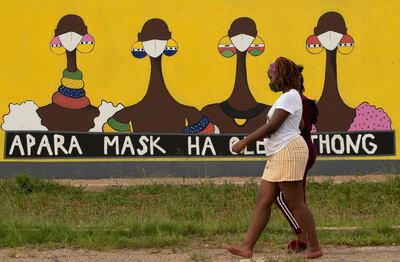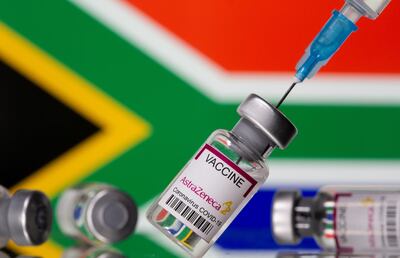Sporadic testing and the dominance of other long-term issues, such as malnutrition and clean water, could leave Africa's story of how it faced Covid-19 untold, a senior charity worker said.
Patrick Youssef, the International Committee of the Red Cross (ICRC) Africa director, said dealing with the daily challenges of delivering existing immunisation programmes in remote conflict areas overshadowed understanding the health impact of Covid-19.
Speaking on the opening day of the Dubai International Humanitarian Aid & Development Conference & Exhibition (DIHAD), Mr Youssef warned against the “massive” socio-economic impact the virus would have on the continent in the years to come.
“Africa may have been hit less than other continents, although there have been several waves of contagion in some countries, the socio-economic impact and resulting psychological burden will be massive,” he said.
“Field operatives not only have to deal with Covid-19, but also a multitude of ongoing issues like malaria, malnutrition and other health problems like ebola and polio.
“The African Centres for Disease Control and Prevention openly speaks about a lack of testing facilities.
“They are mainly confined to urban settings which will never reach more remote parts where there are huge displaced populations living far from cities.
“We need to be aware we do not know much about the impact of Covid-19 on Africa.

“We have little information on related morbidities outside of places with established medical infrastructure for testing.”
Most testing for coronavirus in Africa is focused on just a handful of nations.
In 2020, the African CDC said 10 countries accounted for around 80 per cent of new Covid-19 testing, giving a skewed reflection of how the vast continent had been impacted by the virus.
While some governments were either too poor or too ravaged by conflict to complete widespread testing, others were wary of sharing data that could expose fault lines in health systems.
At the height of the pandemic, the majority of testing was confined to just Rwanda, Kenya, Uganda, South Africa, Egypt, Nigeria, Ghana, Morocco, Ethiopia and Mauritius.
As of March 8, Africa reported 4,003,008 confirmed cases of Covid-19 in a population of more than 1.2 billion, accounting for just 3.4 per cent of total global infections.
South Africa has been the most impacted nation in the continent with 1.53 million cases discovered from 9.45 million PCR tests.
“In Africa, the discipline of using personal protective equipment and its availability is not like elsewhere,” said Mr Youssef, who recently visited the Central African Republic, Ethiopia and Mozambique.
“Countries like Kenya and Rwanda have real discipline, thanks to good governance that can lead to an alert to protect people ahead of a third wave of infection, like we have recently seen in Kenya.
“That is not the case elsewhere.
"In Libya, there was a recent announcement of 300,000 vaccines arriving in April, but the surge of cases was not as expected due to a lack of testing capability and other competing problems.
“Covid is one of several priorities in Africa, so it does not ring as big an alarm bell as it has done elsewhere.
“In some parts of the continent, acute malnutrition is more of a concern.”
The role of the ICRC is to support organisations on the frontline of preventive measures and health facilities with PCR testing programmes.
They also ensure those in areas controlled by armed groups - some 60 million people - have equal access to vaccines when they become available.
The ICRC plays an intermediary role in the field with armed groups to create a safe platform for other populations to benefit from healthcare.
In a time of unprecedented mass global immunisation, Mr Youssef said the ICRC is continuing to support ongoing vaccination programmes for other deadly diseases.
“These have been disrupted massively during the pandemic,” he said.
“When we went to Mozambique and the CAR, other vaccination programmes like polio, were first on the discussion programme ahead of Covid.
“Without access to vaccines in the capital cities and urban areas, these states cannot function.
“Our own worry is that those physically unable to socially distance in areas of detention and in refugee camps are hugely vulnerable and endangers the work of the ICRC.”











